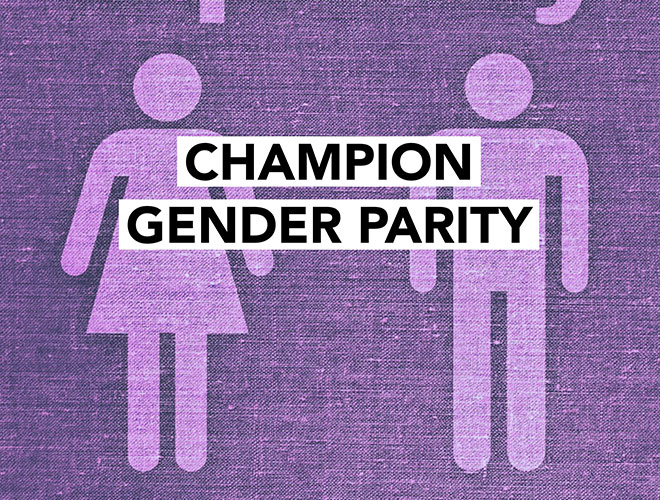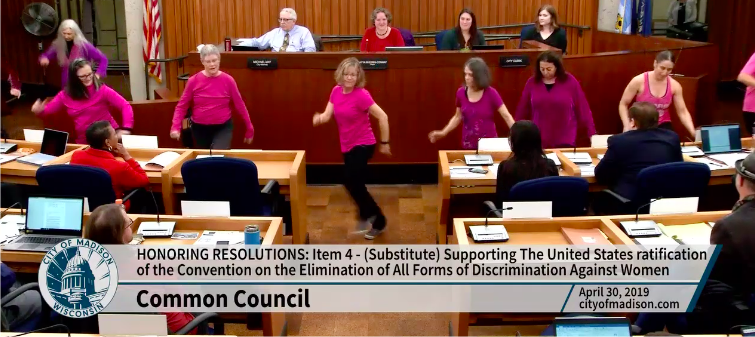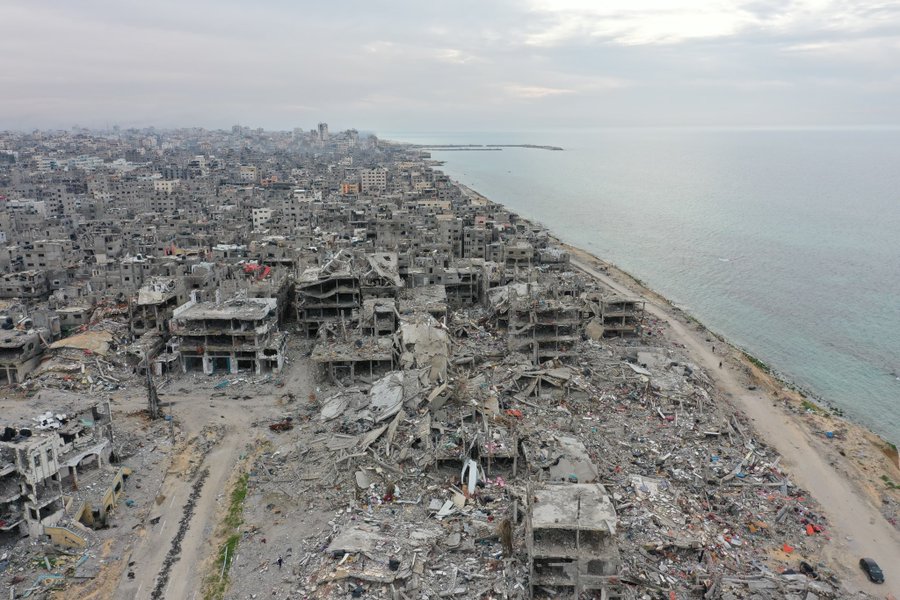Meet the Female Flash Mob who Put Gender Equality Center Stage for their City Council
The Convention on the Elimination of All Forms of Discrimination Against Women (CEDAW, or the Treaty for the Rights of Women), is an international agreement adopted by the UN that aims to protect the basic rights of all women around the world.
Cities for CEDAW is a campaign working to spark global progress at the local level. Americans are encouraged to protect the rights of women and girls by advocating their local governments to pass legislation establishing the principles of CEDAW in their own cities and towns.
Our very own UNA-USA Dane County – Wisconsin Chapter took local CEDAW advocacy to the next level, capturing lawmakers’ attention at a City Council Meeting with an epic and inspiring flash mob dance performance. (Spoiler alert: The vote to pass CEDAW was unanimous!)
We spoke with Chapter President Mary Rathbun to learn how this creative, impactful performance came to life. Before you read our interview with Mary below, skip ahead to the 36:00 minute mark in this video to see what we’re talking about:
First, tell us about your involvement with Cities for CEDAW. Why is it important on the global scale? Why is it important on a local scale?
The scourge of gender-based violence in the United States threatens the basic security of U.S. society and that has consequences for the world. Local CEDAW resolutions and ordinances not only increase the safety of women, girls and others who identify as female in the U.S., but also bring more perpetrators of this violence to justice, while addressing the underlying causes of discrimination and gender inequality.
Cities for CEDAW is important on a local scale because it facilitates the building of partnerships by helping groups leave their silos. For example, we brought together the League of Women Voters; Africaide (a local NGO); the Raging Grannies (a singing group of older women); the local Domestic Abuse Intervention Service; the University of Wisconsin’s Human Rights Project; the UW-Madison Women’s Studies program; 4W (the UW-Madison’s Women and Wellness in Wisconsin and the World initiative); the Wisconsin Network for Peace, Justice and Sustainability; the Returned Peace Corps Volunteers of Madison; and others into one coalition supporting our resolution.
Cities for CEDAW allows advocates to address discrimination and its connection and intersectionality with other forms of discrimination from a perspective that is much less likely to generate knee-jerk opposition in the divisive atmosphere of current U.S. politics.
Tell us about your decision to take such a creative approach to this city council meeting! Was there a source of inspiration behind this impactful moment?
The committee that wrote the resolution in late February, selected our speakers from among the committee members to visually make the point to the city council members that this was an issue that was dear to the hearts of their constituents: black, white, young, old, male and female.
We connected with Dianne Brakarsh, a choreographer and dancer who has led many flash mobs focused on drawing attention to various social and environmental justice issues. Dianne had adapted the choreography and began teaching the dance we used in 2013. She loved our idea of a flash mob at the city council meeting and began recruiting dancers. We only had a month to pull this together.
Our sponsoring alders urged us to do the mob, hiding participants in the crowd of supporting spectators. When Dianne turned on the music, the dancers stripped off their camouflaging jackets and sweaters to reveal their pink tops and rushed onto the floor.
Tell us about the process! How much did you have to practice? How did you create the choreography? How did you choose the song?
We only got the final word about when the council would take up the resolution four days before the actual meeting. Dianne was able to gather 14 women to a final rehearsal the night before the council meeting.
The song, “Break the Chain,” was written specifically for the One Billion Rising movement. Dianne has taught this dance to hundreds of women over the past six years, including many survivors of sexual abuse and domestic violence.
Tell us about the vote! What did you succeed in accomplishing at the city council meeting? What will this decision mean for gender equity your hometown?
The vote in favor of our resolution was unanimous. Now, of course, some of this was due to footwork done between January 1st and April 30th. However, it was the presentation we put on, the number of signatures of constituents on the petition, and the number of supporters in the galleries that carried the day. As the newly elected mayor said after the standing ovation for the Flash Mob, “voting is almost anticlimactic now.”
CEDAW is especially important because it is both an international bill of rights for women and a call for action. Because our resolution included the provision that the Mayor and Common Council should “encourage city staff and elected officials to become familiar with the provisions of the UN Convention on the Elimination of All Forms of Discrimination Against Women (CEDAW) and advise the Council of any changes in policy or practice they feel would help the City of Madison align with the tenets of this convention,” it is an on-ramp to more substantive action.
Specifically, we want it to open the door to a CEDAW ordinance. While a resolution is a formal expression of the opinion or will of an official municipal body, an ordinance prescribes a permanent rule of conduct or government to continue in force until the ordinance is repealed.
In keeping with Cities for CEDAW’s action proposals, we also hope our resolution leads to:
- gender analysis of city operations (such as, workforce, programs, service delivery, resource allocation, budgets, etc.),
- the creation of an oversight body to monitor implementation of a local CEDAW ordinance, and
- funding to support implementation of CEDAW principles.
What did you learn from this experience? What advice would you give other advocates who are looking to raise awareness on behalf of an important issue?
There are no rules! No one had ever brought a Flash Mob into the city council chambers but there was no rule against it. Be creative, involve artists – they have great ideas and wonderful energy that we staid and earnest political types are not tapping into as much as we could, and make it fun.
We urge you to use whatever tools you can to create a feeling in the room that sweeps people along. It works!
Anything else you want to share?
We are proud to have initiated this action on gender equality on behalf of our community and look forward to the positive serendipity that is emerging from it.

Take Action
Urge your Members of Congress to support the UN’s efforts to achieve global gender equality by 2030.
Act Now



